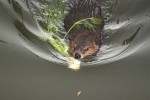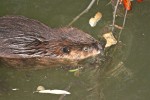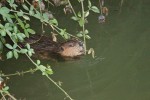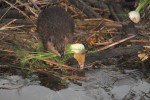Remarkable introduction to Devon Beavers Beaver project from the Devon Wildlife Trust. This is as good a way to introduce beavers as I can think of, and the delight in the announcers voice when she actually SAW the first beaver brought tears to my eyes. I promise you that this recent BBC video is well worth your time. (It was processed and put on youtube by our old friend Peter Smith of the Wildwood Trust and he added his own special additions for the Free Tay beavers.) Enjoy!
Meanwhile, our historic prevalence of beavers in the Sierras paper(s) will appear in the next issue of Fish & Game which is now online. Now we are hard at work at part 2 which is beavers in coastal streams. There was a conference call this week with the key players in that project and Brock and Kate were able to secure funding from the Nature Conservancy for the Sonoma part of that research as part of their larger ‘bring back coho campaign’. Check out this finding from the Fort Ross library of an account to general Vallejo in 1833:
The next valley we crossed is situated three leagues from Bodega. It is called Sayomi. Sayomi has an abundance of year around water and is surrounded by well irrigated lands with timber. About four leagues onward is found a valley called Liuantiyomi. Its creeks form large marshes which are filled with beaver, unlike other places where only vestiges of them remain because of the foreign hunters. Liuantiyomi is located west of the valleys of Santa Rosa and Jaquilliyomi, and appears to have the best environment for the founding of a town.
Of course once he received that report Vallejo was off to see for himself, so we have his translated report as well! We’re close to pinning down the exact location, somewhere between Sebastopol and Occidental as a league was ‘as far as a man could walk in an hour’ but it makes for a exciting detective novel. Although not as exciting as this ‘false lead’ which I found in a this report from father Manuel Venegas 1739 after his trip to some islands in Baja California:
With regard to amphibians, many beavers are also found around the island. Since these sleep in the sea close to the beach with their feet skyward, to hunt them, the Indians trap them while they sleep. They go into the water, knock them on the head with a stick, and with a line of cordage drag them to the beach already dead. Other times, they kill them with their arrows, when the beavers come to shore, or get very close to it.
Don’t you just love the idea of beavers as amphibians? Or sleeping with their feet in their air? Sadly as much as I enjoyed his account he was obviously talking about Sea Otters even though he used the spanish “Castores“ and everything. Clearly the word “beaver” just meant “Furry animal whose coat I wanna sell” and it could be applied everywhere. We’ll keep looking!
And a reunion at the beaver dam last night with several Worth A Dam members gathered to see the kit emerge from above the primary dam. Did he have a sleepover with his aunt to give his parents the night off? Apparently Moses said he’s seen it before, but its the first I’ve heard of it. Nice photos from Cheryl










































